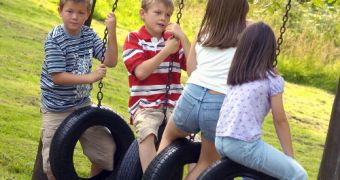While it seems weird for kids not to play and move around a lot while they are small, this is precisely what happens in countries such as the United Kingdom. Authorities here are very worried about this trend, which will soon begin translating into a public health problem.
Low levels of physical activity have been linked with a host of problems, including afflictions of the cardiovascular system, heart problems, obesity, diabetes and so on. If children become apathetic and static from an early age, it's conceivable that they will grow to behave the same way later on.
In a new study, a team of experts shows that having a best friend is generally a positive thing for children, but also a boost for their levels of physical activity. Kids who play with their friends in the neighborhood naturally exhibit higher levels of exercise than others.
While this may seem redundant and straightforward to some, it is an important finding in the UK because it highlights potential mechanisms through which scientists could reduce future ailments in the general population.
If only a few kids do not engage in physical activity, then that's perfectly normal, but when most don't, then that's a problem. The new study was conducted on children aged 10 to 11.
The research detailing the findings was published in a paper called “Better with a buddy: influence of best friends on children’s physical activity,” which was authored by experts at the University of Bristol.
The work was already published online, in the latest issue of the medical journal Medicine & Science in Sports & Exercise. Scientists were supported in their effort by a grant provided by the British Heart Foundation (BHF).
In charge of the study was scientist Dr Russ Jago, who worked closely with colleagues at the UB School for Policy Studies (SPS) Center for Exercise, Nutrition and Health Sciences.
“With many young people not meeting current UK physical activity guidelines there is a need to identify new ways of making children more physically activity,” Jago explains.
“Our findings show that supporting physical activity among friendship groups and encouraging friends to be active together, particularly outside of school, may bring about important changes to children’s physical activity,” he adds.
The study was conducted on some 986 kids. The researchers had full physical activity and best friend data on 472 of them. The participants had to answer questionnaires about how much time they spent playing with their friends, on average.
“This research proves the strength of buddy power – simply exercising with a best friend or having a friend who is a good exercise role model increases the chance of a child keeping fit and active,” explains BHF cardiac nurse Natasha Stewart.
“We know that kids who exercise during childhood are more likely to continue these good habits as they grow up – reducing their risk of heart and circulatory disease,” she adds.
“We are currently faced with a generation of kids whose waistlines are expanding. This research shows that easy initiatives like encouraging your child to run around with their best friend could have a big impact on their health,” Stewart concludes.

 14 DAY TRIAL //
14 DAY TRIAL //